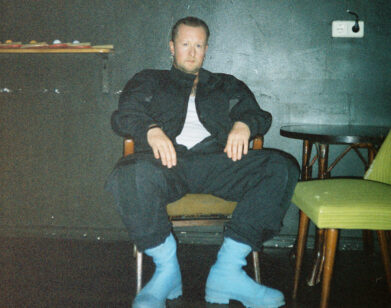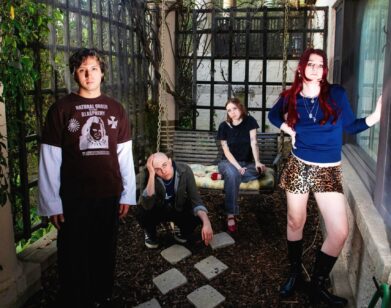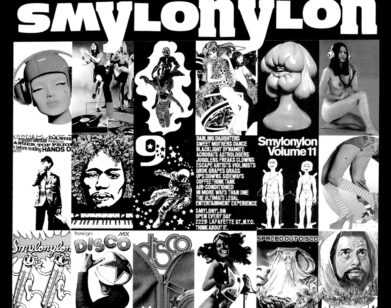A Curse Lifts
MENACE BEACH IN LONDON, DECEMBER 2016. PHOTOS: ROBERT BELLAMY. SPECIAL THANKS: BAR ITALIA.
Punk, surf punk, pop punk, indie rock, noise rock, alternative: these are some of the labels that have been applied to Menace Beach, the Leeds, England-based band, which seems to both encourage and resist classification. Their process, it turns out, allows for this fluidity: since their first EP in 2012, the five-piece has not been afraid to meld and mash musical styles and influences, and features a rotating group of players, save Liza Violet and Ryan Needham, the band’s founders. (Other members have included Nestor Matthews of Sky Larkin, Matt Spalding of You Animals, Nick Chantler of Seize the Chair, and MJ of Hookworms.) Much is written about their ‘90s alt-rock sound, but that era is only a jumping off point.
Later this month they’ll release their sophomore album, Lemon Memory (Memphis Industries). While their first LP, 2015’s Ratworld, was considered Needham’s record—he was the dominant writer and vocalist—Lemon Memory is very much Violet’s tour de force. Interview recently called up both rockers to discuss the album, and today we’re pleased to premiere its seventh song, “Suck It Out,” as our track of the week.
MATT MULLEN: I have to ask about the genesis of this album. I read on your website that a “citrus curse” was involved. What do you mean by that?
RYAN NEEDHAM: When we were away in Europe last year, we picked up this book, and it was all about folklore and bit of occult stuff. And there was this thing where you could curse your enemy or someone you hated, or bring them bad luck, by preparing these lemons, a bag of lemons, and then burying them on the property of the person you wanted to curse. As we were reading this I was like, “I think this happened to us.” In our old house, maybe six years ago, I found an old bag of lemons. I don’t know if that was the intended outcome, but that was sort of a jumping off point. It sparked something in my mind—I was like, “What if that did happen?” And then we thought about reversing that.
MULLEN: Are you normally a believer in the occult?
NEEDHAM: Not really, no, but this got me doing a bit of research into it. There comes a point when you have to put the brakes on that because you get pretty far down there, although a lot of artists have gotten involved in this kind of thing.
MULLEN: So what was the writing process like? I read this is more Liza’s album, whereas Ratworld was more yours, Ryan.
LIZA VIOLET: I think the last one was Ryan writing pop punk-y songs and me embellishing them. Whereas this time we started off with things that I had written, or synth lines, or melody ideas I had. I think after the last album I had way more ideas, looking back—things I wish I had done the first time around.
MULLEN: What were some of those things?
VIOLET: Just little bits of melody, textures, sounds. I get really into the production side.
NEEDHAM: Liza wanted it to be a lot more drone-y and dirge-y. With the first one, I had been quite rudimentary in my playing and writing—which is good, I like that—but then Liza, like she said, would embellish and make it bit more interesting. But rather going from a rudimentary basic song and then trying to fuck with it, we thought, “We could start off in a better place here,” and so we did it the other way around.
VIOLET: Yeah, we’d start with drum patterns and add textures and stuff. We did a lot of chopping off drum parts to structure it afterwards, rather than starting with a structure and embellishing it after.
MULLEN: Alternative music of the ’90s seems to be a big influence for you guys. Was that the case this time around?
VIOLET: With Ratworld we didn’t really think about that. We got labeled as that afterwards, but it wasn’t something we thought about. We tend to ban ourselves from listening to too much music when we’re writing anyways; it’s too easy to get too influenced by stuff. You’ll hear something and it’s like, “Oh, god, we should do something like that.” When we were writing this time I didn’t listen to that much stuff.
NEEDHAM: With all the ‘90s stuff, it’s like, we’re not 17 years old. That’s the music that when I was 13, 14, 15, or first getting into music, was my thing. So we don’t want to ever just stay in that style. I was late to get into the ’90s alternative American stuff anyway; it was more classic Brit pop for me from the start. This time I did finally get into the Fall. I started listened to the Fall and Cate Le Bon’s DRINKS album.
VIOLET: That DRINKS album is amazing.
NEEDHAM: Also Iggy Pop, Velvet, that kind of stuff. We were listening to stuff further back.
MULLEN: The reason I asked that was, while I hear the ‘90s influences, your stuff manages to sound contemporary and fresh. It is because you work with a diverse body of collaborators?
VIOLET: Well, we tend to write stuff between the two of us, to the point that we’re happy with it, and if anyone else wants to contribute after that they can. We lead spaces where we’re like, “If someone wants to do something with it, they can”—to a point that they can do what they want with it so we’re all happy, if that makes sense.
NEEDHAM: The thing that I like about it the most is that we’ll have the skeleton of a song, which doesn’t really change that much, with [some] exceptions. But the good thing about getting other people to play on it is I feel like I can enjoy it more once we’ve actually recorded it. There are some songs on the album that I’ve only just done a vocal, I’ve not played guitar. So for me listening back to that, I feel like I can listen to it a bit more objectively. And even when we’re mixing and stuff like that, it feels like I’m in it for a different band, in a way. Not completely, but you can be less attached to it, which is a good thing, really. You can be more ruthless in the decisions you make with the editing and stuff like that.
MULLEN: You’re about to begin a pretty big tour, including coming to the U.S. for South by Southwest. How does it feel?
VIOLET: Coming to the States is a big thing for us.
NEEDHAM: I think this one is the longest run. We’re going to have to be quite disciplined.
MULLEN: What are your coping mechanisms when you’re on the road?
VIOLET: Sleeping. I can sleep anywhere at any time. I can sleep sitting up in the dressing room. That’s my coping mechanism.
NEEDHAM: Lots of coffee. We’re doing dry January to prepare and reset the body. We’ve been to the gym every day the past four days, and we’ve been running. We’re probably going to last a few days. But the idea is to get it all in before we go and then we’ll be all right. [laughs]
MULLEN: Do you have any plans to perform in New York?
NEEDHAM: Hopefully! The plan is to fly into New York and do a few shows before South by Southwest. It’s currently being discussed.
MULLEN: Besides the tour, and celebrating this album, what’s next? Are you working on new music?
VIOLET: Yes. All of the things I wished I did on this album I’m working on for the next, and all the things I learned from it.
MULLEN: What have you learned from it?
VIOLET: Just about certain processes and how to make a sound sound like I want it—more technical stuff.
NEEDHAM: Me and Liza are slightly different in that at this point Liza’s done with the album—that’s it. She’s probably never going to listen to it again. Whereas I like the end result. I’m not obsessed with building it; I like this point. I listen to it pretty much every day. Liza has a work-like approach to it. And then it’s, “Next.”
VIOLET: Because by the time I’m done, I’m like, “I never want to hear this ever again.” [laughs]
NEEDHAM: In the meantime we’re trying to stay creative.
LEMON MEMORY (MEMPHIS INDUSTRIES) WILL BE RELEASED JANUARY 20, 2017. FOR MORE ON MENACE BEACH, VISIT THEIR FACEBOOK.







